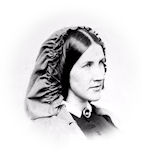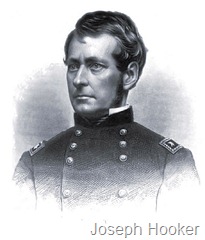Camp Winfield Scott, Thursday, May 1, 1862.
Dear Cousin L.:—
Your letter of the 26th arrived yesterday. We have a resting day to-day, as we were in the trench yesterday, so I will write to-day. To-morrow we go on picket, next day in the trenches, and so on. We received news day before yesterday of the capture of New Orleans and as it went from camp to camp it seemed to give the men a new start. There was no cheering. I have not heard a cheer or a drum since we came here except in the rebel forts. But men, when they get such news as that, must have some way of working off their excess of joy. If the orthodox way of allowing it to escape from the lungs in boisterous and prolonged cheers is not permitted, some other will be found. We worked ours off with the pick and shovel. The general in command of the trenches said we threw more dirt out of the ditch in three hours yesterday than the same number of men did in all day the day before. Men will work when there’s a prospect ahead and there seems to be a determination on the part of this army, that, if it depends on us, the honor of restoring the Union shall not rest wholly on the army of the west. That portion of the army has done nobly. They have had the hardest fighting to do, but, if I do not mistake the character of the men I see in the army here, they only wait the opportunity to do as well. The Vermont troops at Lee’s Mill the other day, walked, so to speak, into the very jaws of death without flinching. Not one-fourth of them live to tell the story. The sons of the “Green Mountain Boys” of the Revolution do not seem to have degenerated.
You think I make light of our annoyances and privations. Well, it may be so. There are a few who are constitutional grumblers. They never are satisfied with any treatment or any regulation. They find fault with everything. In fact, if they ever get to Heaven, they’ll be finding fault with the music. Such fellows are the butt for all the ridicule their comrades can heap on them. No mercy is shown to them. A man must show himself a man to get along pleasantly with the company. In general it is so. “Come what will, we’ll be gay and happy still,” is the song and the sentiment of the greater part of the men. There seems to be a pride felt in enduring what at home we would consider hardships, without complaint. But the soldier’s life is not all hardship. It is a pleasant sight to look on a group sitting round a fire in the evening, whiling away the time with stories of the past and speculations of the future. Then you would always see the pipes there. That you wouldn’t like. But for some reason a soldier does enjoy his tobacco. A count was made the other day of the men in our company who use tobacco and of the eighty-seven present sixty-one fell under the ban. I think that a fair average of the regiment. Since we came here the boys have gone to making pipes of the laurel roots that grow on the old breastwork thrown up in the Revolution. I have one that I think a great deal of.
We were sitting round the fire the other night passing the time away when H. joined us. He is the life of the company, and always welcome anywhere. He was asked for a song and gave “Bingen on the Rhine,” a song you have probably seen. As he sang one verse and another, “Tell my mother that her other sons shall comfort her old age, Tell my sister not to weep for me or sob with drooping head,” and so on, I saw a good many faces that relaxed their look of firmness and I thought a good many in the circle were thinking of their friends. There are hours when the soldier “unbends his iron front” and allows the thoughts of home and its pleasant associations to occupy his mind, but it is only as a relief that this is done. You will generally find him apparently careless of the past or future, buoyant, self-reliant, and only mindful of the present.
L. was married the 2d of April at home. She is now Mrs. C. H. P. There, your nose is broke, as they tell the next older when the crisis or cribub arrives. You can’t monopolize the marriage list any longer. Who would have believed though, that she would be married before I thought of such a thing? Oh well, there’s time enough yet. If the young ladies think half as much of the soldiers as they pretend to, perhaps I may find one somewhere if I ever return. E., I believe, has given up his idea of going to West Point. He found that there was no vacancy from our district. He has hired out to farm it this summer.
I see that my correspondents intend to keep me supplied with stamps. I got a letter from home the other night with a number in it. Then Aunt A. sent me some, and now I have to thank you for a number more. They are really an accommodation here. I have seen a good many of the boys sell their rations for stamps because they could not get them in any other way. But the arrangements are better now and I don’t think there will be much difficulty in procuring them hereafter.










